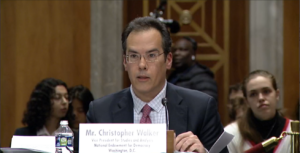China’s ideological proclamations – that it will supplant the United States as the leading world power, remake the international system in its illiberal image and thwart U.S.-led efforts to “contain, encircle and suppress” China – are in part motivated by insecurity, notes Jessica Chen Weiss, a professor of government at Cornell University and the author of “Powerful Patriots: Nationalist Protest in China’s Foreign Relations.”
Most Communist states have collapsed, and the Chinese leadership fears being next — and are meant more to instill domestic confidence and loyalty to the party than to reflect actual policy or fixed beliefs, she writes for The New York Times:
Ideology in China is itself malleable, rather than a rigid cage that determines policy and has been continually tweaked to justify the maintenance of one-party rule through decades of great change. U….There is no doubt that China — whatever its trajectory — poses a huge and complex policy challenge for America. But exaggerating fears of an “existential struggle” increases the likelihood of conflict, crowds out efforts to tackle shared challenges like climate change and creates a with-us-or-against-us framing that could alienate the United States from allies and much of the world.
 While the autocrats take information and ideas seriously, they are not engaged in a form of communications and public diplomacy as democracies would understand it, said Christopher Walker, Vice President for Studies and Analysis at the National Endowment for Democracy (NED). Instead, they often are pursuing more malign objectives that associated with new forms of outwardly directed censorship and information manipulation, which my colleagues and I have described as “sharp power,” he told a hearing of the Senate Foreign Relations Committee.
While the autocrats take information and ideas seriously, they are not engaged in a form of communications and public diplomacy as democracies would understand it, said Christopher Walker, Vice President for Studies and Analysis at the National Endowment for Democracy (NED). Instead, they often are pursuing more malign objectives that associated with new forms of outwardly directed censorship and information manipulation, which my colleagues and I have described as “sharp power,” he told a hearing of the Senate Foreign Relations Committee.
As NED President and CEO Damon Wilson recently observed to this full committee, he added, “with Russia and China at the vanguard, authoritarian powers have grown increasingly more assertive and ambitious… and in an era of global interconnectivity, [these autocrats] recognize that keeping their own citizens in check is no longer enough to cement their power, and so they’re partnering with other like-minded autocracies to share ideas, resources, and technologies.”

National Endowment for Democracy (NED)
The U.S. is being ‘vastly’ outspent by China in the global information wars, the committee heard. The session also heard testimony from Amanda Bennett, Chief Executive Officer, Agency for Global Media; David Stilwell, Air Force Academy Institute for Future Conflict, former Assistant Secretary of State for the Bureau of East Asian and Pacific Affairs; and Jessica Brandt, Brookings Institution.
“We are at a turning point,” Bennett said (above). “Authoritarian regimes use malign influence, disinformation, propaganda, and manipulation of information to cut off the flow of information and discourage those seeking factual information about and around the world. The governments of China, Iran and Russia often work together to increase their harmful influence,” she added.
U.S. adversaries like China and Russia would almost certainly take advantage of a debt default to project chaos in the country to the rest of the world, said Director of National Intelligence Avril Haines.
“Generally, both Russia and China would look to perceive — narrate — through information operations such an event as demonstrating the chaos within the United States, that we’re not capable of functioning as a democracy, and the governance issues associated with it,” she told a Senate hearing. “They’ve done that on a range of things.”
#China‘s rhetoric on global governance reform resonates in developing states. But the #CCP‘s self-serving, nationalist ideology is unlikely to captivate the world, especially as Xi’s authoritarian ways feed mistrust, @jessicacweiss writes @nytimes https://t.co/7dl34SHxS4
— Democracy Digest (@demdigest) May 4, 2023







